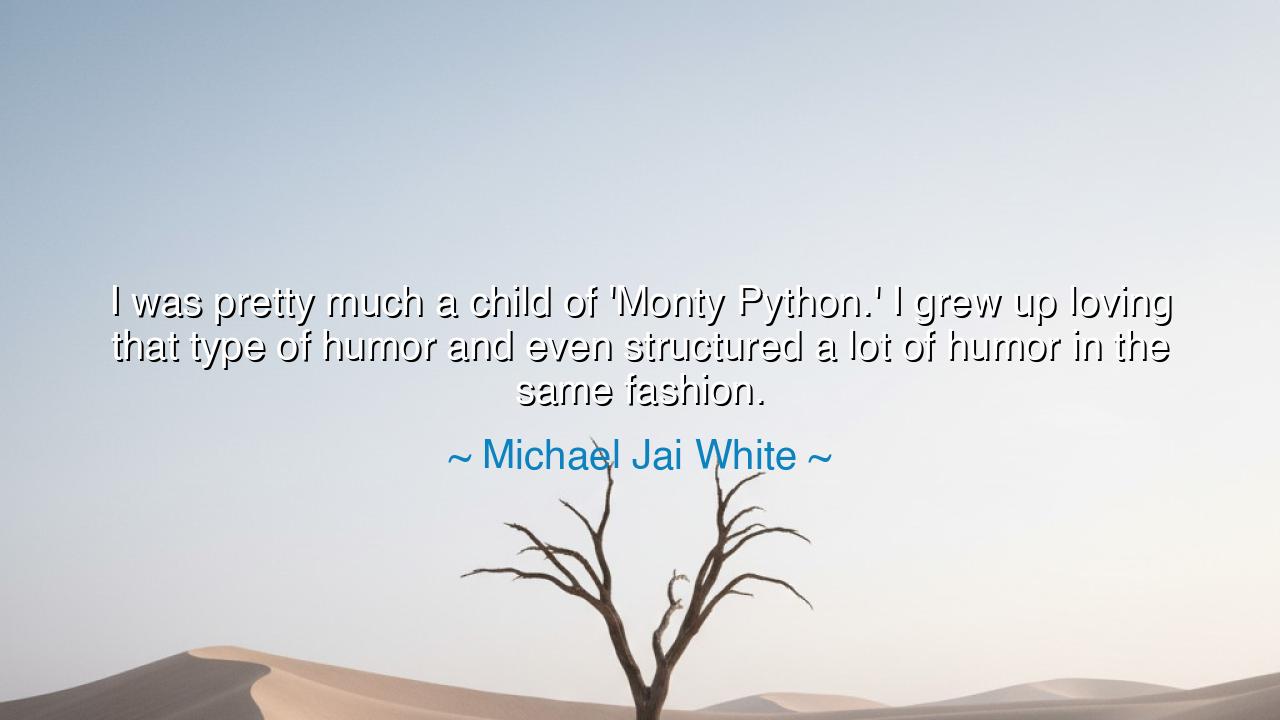
I was pretty much a child of 'Monty Python.' I grew up loving
I was pretty much a child of 'Monty Python.' I grew up loving that type of humor and even structured a lot of humor in the same fashion.






In the grand journey of life, where one’s path is shaped by the stories we encounter and the influences we absorb, there are moments when we realize that the humor we are drawn to speaks not just to our intellect, but to the very core of our being. Michael Jai White, in his reflection on the role of humor in his life, says, "I was pretty much a child of Monty Python. I grew up loving that type of humor and even structured a lot of humor in the same fashion." This powerful statement carries with it a profound lesson—humor is not merely entertainment; it is a form of expression and a shaping force that influences how we see the world and engage with others. For White, the absurdity, the sharp wit, and the brilliant irony of Monty Python shaped not just his comedic style, but also the lens through which he perceives the world.
The ancients understood well the transformative power of humor. Aristotle, in his exploration of ethics and drama, recognized that laughter is a reflection of life’s absurdities. Comedy, he said, has the power to reveal the deepest truths about humanity, often by exposing the irrationality that lies at the heart of human behavior. The work of Monty Python is no different. With their unique brand of absurdist humor, they sought to shine a light on the contradictions and folly of society, not through direct satire or political commentary, but by embracing the irrational, the bizarre, and the unpredictable. In this way, White’s identification with Monty Python speaks to an ancient truth—the power of humor lies not just in making us laugh, but in making us see the world differently, revealing its hidden truths in the most unexpected ways.
Consider the story of Diogenes, the ancient philosopher who famously wandered the streets of Athens with a lantern in daylight, proclaiming that he was searching for an honest man. His actions were not just bizarre, but profoundly satirical—a form of humor that sought to expose the hypocrisy of society. Diogenes’ humor was not about light-hearted amusement, but about using absurdity to challenge the deeply held assumptions of his time. In much the same way, Monty Python used absurdity to hold a mirror to the world’s most serious issues. They didn’t mock society directly; instead, they turned its irrationality and contradictions into comedic sketches, making us laugh while simultaneously forcing us to confront the deep flaws in our systems and beliefs. White’s connection to this form of humor speaks to the timeless appeal of comedy as a vehicle for both joy and reflection.
The lesson we can take from Michael Jai White’s reflection is this: humor, when done with intent and understanding, is not just a means of escape but a tool of awakening. The absurdity that Monty Python embraced is a reminder that, in life, there are moments when the most profound truths are not revealed through seriousness or logic, but through the absurd and the unexpected. Humor, like that of Monty Python, does not simply entertain; it illuminates, showing us the chaos beneath the surface of our well-ordered lives, and challenging us to see beyond the obvious. White’s approach to humor—structured in the same fashion as his comedic heroes—speaks to the idea that we must not only embrace laughter but also the deeper meanings that lie beneath it.
In life, we often take ourselves far too seriously, forgetting that the world is full of contradictions and ironies. Like Monty Python, we must learn to embrace the absurd in order to find the truth. White, by shaping his humor after Monty Python, embraces this ancient understanding. Comedy, in all its forms, holds up a mirror to life’s most irrational elements, and by doing so, helps us understand the deeper truths that we might otherwise overlook. It is through humor that we can make light of our own contradictions, laugh at the absurdity of our lives, and in the process, discover new perspectives.
Take, for example, Aristophanes, the great comic playwright of ancient Greece. His plays, like those of Monty Python, were full of absurdity, yet they were not mere distractions. They held up a mirror to the political and social issues of Athens, making the audience laugh while also inviting them to reflect on their own society’s failings. This ancient tradition of using humor as a tool for reflection is one that White continues in his own life. By embracing the comedic style of his heroes, he aligns himself with the great comedic thinkers of the past, understanding that laughter can be a powerful form of social critique.
So, let us take this wisdom to heart. Let us remember that humor is not just about laughing at the world, but about seeing it through new eyes. Let us embrace the absurd, the illogical, and the unpredictable, recognizing that in these moments lie the greatest truths of our shared human experience. Like Michael Jai White, let us find the courage to structure our own lives with the same humor, creativity, and reflection that Monty Python taught us. In doing so, we will find not just laughter, but a deeper understanding of the world and our place within it.






AAdministratorAdministrator
Welcome, honored guests. Please leave a comment, we will respond soon